An over-heightened sensitivity, coupled with innate naughtiness, led me to start Kneehigh
Mike Shepherd, 2008
Your browser is no longer supported. Please upgrade your browser to improve your experience.
Kneehigh’s
History
Kneehigh Theatre was founded by teacher Mike Shepherd (b1953) in Cornwall in 1980. The first phase of Kneehigh’s development commenced with theatre workshops run in Shepherd’s spare time. These workshops were a collaboration with an eclectic group of individuals – including students, a farmer, a sign writer, a thrash guitarist and an electrician – with a mandate to create work for children and their families. This company of players would become Kneehigh Theatre – with its own distinct manifesto and ethos for creating vibrant, energetic, accessible, touring productions for a wide audience.
From the beginning Kneehigh approached theatre by organically developing ensemble pieces of a highly physical and spectacular nature, to be performed in local environments. This ethos is reflected in much of their early work in pieces such as Awful Knawful (1980) based loosely on the stunt motorcyclist Evel Knievel, The Mystery Machine (1981) based on the Children’s book The Phantom Tollbooth by Norton Juster, Mrs Corbetts Ghost (1981) based on the novel of Leon Garfield and Around the World in Eighty Days (Minutes) (1982) adapted from the Jules Verne classic. These productions were performed for families in both conventional locations such as community centres and alongside those of an increasingly unorthodox nature such as cliff tops, up trees and on abandoned industrial sites.
An over-heightened sensitivity, coupled with innate naughtiness, led me to start Kneehigh
Mike Shepherd, 2008
After establishing a reputation for this early work it would be their 1985 production of the Cornish tale Tregeagle which would lead the Company in a new direction. A piece originally conceived by Shepherd as a production for schools earlier in the 1980s, Tregeagle’s second incarnation – with the influence of director Jon Oram – became an innovative, high-energy creation. The production was significant in terms of the use of music and song as part of the narrative, as well as incorporating masks and energetic ‘theatre sports’, the latter credited to Oram as a lasting contribution to the Kneehigh aesthetic. Importantly, Tregeagle was also their first production to tour outside of Cornwall and – thanks to Oram – to receive grant funding. This production would come to define Kneehigh’s second phase, embodying the philosophy that ‘grass-roots theatre’ could build audiences – as established by Footsbarn in the 1970s. Shepherd sites Footsbarn and their decision to leave Cornwall in 1984 as an important factor in Kneehigh’s early development. Kneehigh’s work shared a similar aesthetic, attracting the local Footsbarn audience, and Shepherd acknowledges that that pressure of expectation in the vacuum left by the more established company forced Kneehigh to improve.
The latter half of the 1980s saw Kneehigh touring regularly outside of Cornwall including several visits to Edinburgh Festival with productions such as Cyborg: A Folktale of the Future (1987), Stig (1988) a reworking of Clive King’s Stig of the Dump, and Sun and Shadow (An Electric Adventure Story) (1988) which toured both in schools and a 300 seater big top tent. During this time the Company also maintained their Theatre in Education programme with Footprints I and II (1986-87) taking children on a hunt for a magical beast, The Thinking Kit (1990) encouraging children to develop imaginative lateral thinking, and The Story Box (1989-90) a magical adventure introducing infants to using costumes and music.
In 1989, Kneehigh celebrated the official opening of their rehearsal barns at Lamledra, Gorran Haven. This was the first time the Company had a permanent base to work on Research & Development and rehearsals, and remains their creative base to date. Shepherd describes the barns in Cornwall as a place where things can get done, “a secret, special place where we can seed ideas”. Almost all Kneehigh productions after 1990 started life there, with the cast and creative team assembling for an intense fortnight of collaborative devising.
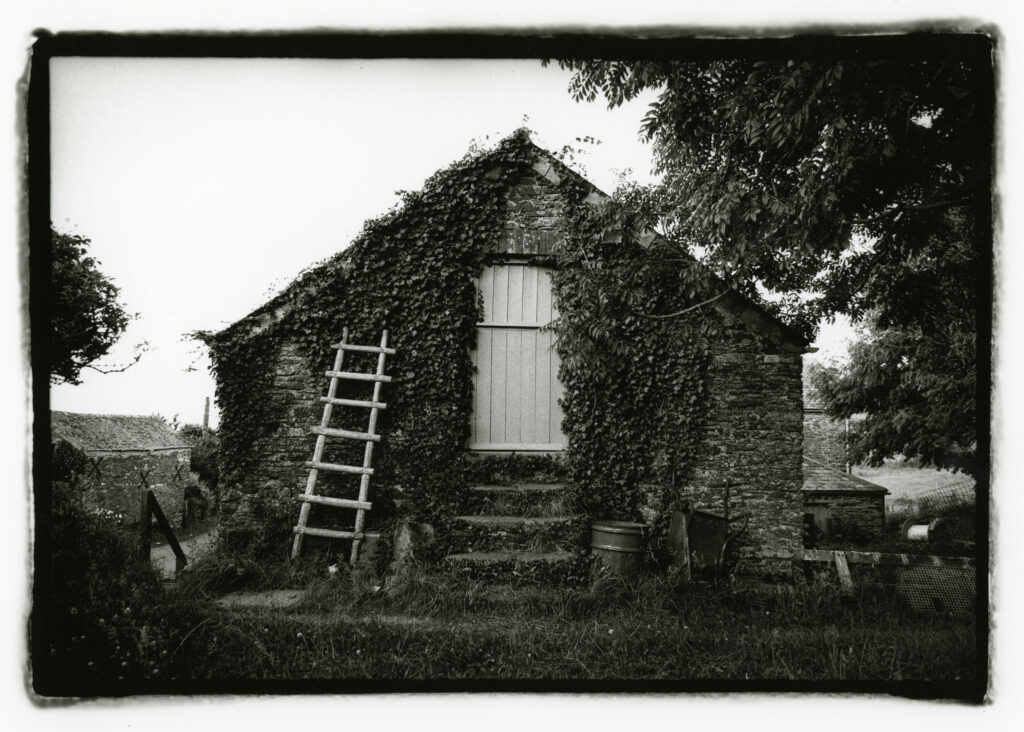
The Kneehigh Barns, Gorran Haven, 1990. By Steve Tanner
One central theme of Kneehigh’s work is the Company’s commitment to the use of fairy tales, myths and legends which during the late 1980s & 1990s would come to embrace both those of a Cornish and European tradition. Another incarnation of Tregeagle in 1989 would prove important for the Company as it was the first production built for touring outdoors, and the first with Bill Mitchell as designer. Mitchell would become a significant force in the design and directorial vision of not only Kneehigh but in the wider theatre world, focussing increasingly on creating large-scale pieces of walking theatre that used landscape not just as a backdrop but as an integral part of the storytelling. He had previously worked with Welfare State International who created large scale outdoor spectacles, and contributed that passion and experience of site-specific work to Kneehigh’s increasing vocabulary. Mitchell went on to form his own company Wildworks with his partner Sue Hill. The first Wildworks production was a co-production with Kneehigh – A Very Old Man with Enormous Wings (2004).
In addition to the outdoor, high design work of Mitchell, Shepherd characterises Kneehigh’s 1990s through the collaboration with playwright Nick Darke. Amongst others, Darke wrote Ting Tang Mine (1990), The King of Prussia (1997), and The Riot (1999) all three telling politicized stories of Cornwall through a lens of Kneehigh’s irreverent energetic performances. In these plays Darke’s voice shines through: “playful and political, fantastical and yet grounded, profoundly Cornish (wherever the play might be set), fierce, angry, stubborn, warm, exotically foreign, and always, like the author, terribly funny” (read the full article). The King of Prussia was a breakthrough for Kneehigh; the first time they had performed in London – and to nearly universal positive reviews – gaining them and Darke high profile interest from The National Theatre.
These two approaches adopted by Kneehigh in the 1990s were far from disparate. Many successful productions in the 1990s such as the King of Prussia were collaborations between Darke, Shepherd and Mitchell, with Darke writing, Mitchell designing and often directing, and Shepherd splitting his time between devising, directing and acting. Other recurring and lasting Kneehigh collaborators of this time included Jim Carey on music, and recurring performances by Sue Hill, Bec Applebee, Tristan Sturrock, Giles King, AnnaMaria Murphy, Carl Grose and Emma Rice who went on to become Artistic Director of the Company.
Shepherd credits The Red Shoes (2000) as heralding “the brilliant new era of Emma Rice’s directing” which, after joining Kneehigh as an actor in 1994, led to her taking over from Mitchell as Joint Artistic Director of Kneehigh in 2004.
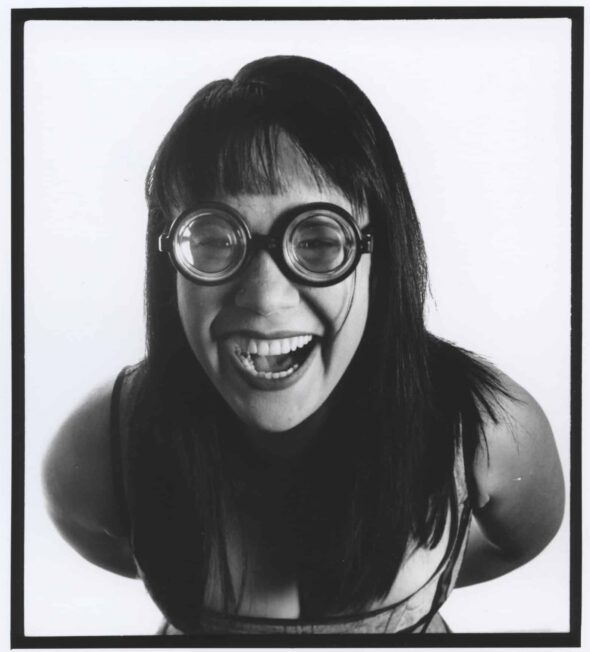
Emma Rice, Company Headshot. Image by Steve Tanner, 1997
Under Rice, Kneehigh’s rehearsal programme reflected her earlier work with Gardzienice Theatre Association in Poland. It was isolated, completely dedicated and extremely physical, but critically they channelled that discipline to develop a method that Rice describes as based on joy, not on pain.
Certainly Rice had a lasting impact on the Company; Dave Mynne of Kneehigh states “We used to joke about the ‘Kneehigh school of pointing, shouting and running’: if in doubt, fill the space and make a noise. Emma has added a lot of the elements that we always wanted to have there: the darkness, the stillness” (read full article). This darkness and stillness, coupled with the earlier anarchy, energy, willingness to explore the landscape and intriguing ‘Cornishness’, brought Kneehigh further to the attention of major theatres across the UK and beyond. This can be seen in key productions from this period such as Pandora’s Box (2002), a collaboration with the Northern Stage ensemble, The Bacchae (2004) and The Wooden Frock (2004), a co-production with the West Yorkshire Playhouse in Leeds, and latterly The National Theatre’s programming of Tristan and Yseult (2005) and the 2007 adaptation of A Matter of Life and Death.
With Rice at the helm, Kneehigh showed a marked increase towards adaptation including books, films and television programs, but also the folk tales, myths and legends that were always the traditional fare of the Company. This use of adaptation allowed Kneehigh to lend its aesthetic to existing texts and thus expand and cement its own sense of style and vocabulary amongst the national theatre scene. When adapting productions Rice begins with her own cultural memory, preferring to work with ‘her truth’ to try and remember what stuck with her from a story. Only then would she revisit the text and proceed to develop the production with the Company.
As part of their year-long ‘Complete Works’ Season of 2006 The Royal Shakespeare Company commissioned Kneehigh to produce Cymbeline (2006) to be performed at The Swan in Stratford. The script was given an anarchic, irreverent treatment by Rice and Kneehigh, with the resulting performance polarising audiences and critics. Some critics described Cymbeline as lacking emotional depth, or being a paraphrase closer to pantomime, but by the time it reached London Rice’s treatment was being praised (mostly by female critics) for getting to the heart of the play, and finding a clear narrative through a knotty drama.
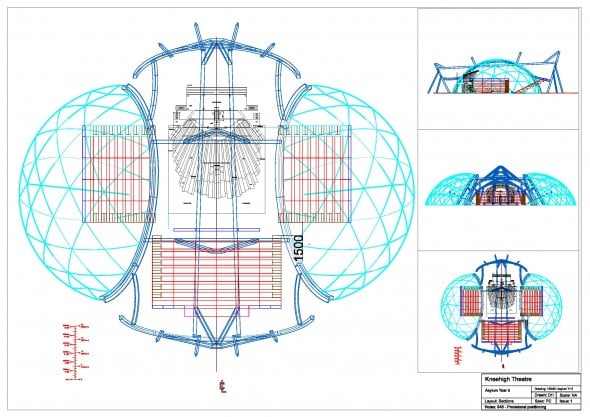
Technical plan of the Asylum
After years of planning and grant proposals, Kneehigh’s nomadic venue The Asylum was finished in the winter of 2009/10. Able to transform from a 200-seater suitable for a village green, to a 750-seat auditorium, the venue was funded in collaboration between Kneehigh, Cornwall Council, Arts Council England, the hugely successful Kneehigh Friends Scheme and others. The Asylum enabled Kneehigh to maintain a performing presence in Cornwall despite outgrowing most of the County’s theatres, whilst also being free to pack it away and follow their other strands of work, touring traditional theatres and building their reputation further afield. The Company remaied committed to its Cornish identity – Shepherd believes that maintaining this was crucial to Kneehigh’s appeal and success.
As well as performances specifically designed for the Asylum such as Midnight’s Pumpkin (2012) and Fup (2016), in the 2010s Kneehigh continued its tradition of evolution, frequently collaborating with other companies, theatres, performers and producers. Steptoe and Son (2012) was co-produced with the West Yorkshire Playhouse and Daphne Du Maurier’s Rebecca (2015) was produced by David Pugh and Dafydd Rogers in association with Kneehigh. Umbrellas of Cherborg (2011), a collaboration with the Gielgud Theatre, involved a new cast and musicians under the Kneehigh name. Although infused with the Company spirit, Rice admits this production pushed the boundaries of qualifying as a Kneehigh show.
Kneehigh always adapted to political changes as well as internal structures. While recognising that increased arts funding under New Labour was a boom period for Kneehigh, Shepherd reflects that the 2010s forced Kneehigh to reduce the number of new shows they produce. In an interview in 2014 he notes that due to risk-averse theatres, a new production must do an initial run, then book a tour a year in advance to be financially viable. Certainly Kneehigh were no strangers to bringing back their own classics to huge success. As well as various incarnations of Tregeagle, Rice insisted The Red Shoes be the first production in the Asylum in 2010. Tristan and Yseult has been revived many times both in the UK and internationally. This production toured the UK once again in 2017 following an international indoor tour and was redesigned once more for the outdoors by Bill Mitchell’s, his final design for Kneehigh before his death in April 2017.
Tristan & Yseult – Designing: Interview with Bill Mitchell
While Rice had been a dominant presence in for over 20 years, Kneehigh’s evolutionary past put the Company in good stead to withstand this change. Carl Grose joined Mike Shepherd as Deputy Creative Director in 2018, bringing a roll call of Kneehigh credits with him that was rivaled by few others – including his early performances in King of Prussia in 1995 through to his critically acclaimed writing of Tristan and Yseult, Cymbeline, The Baccahe and the hugely popular Dead Dog in a Suitcase (2014). As Grose notes “This was never a plan. But it certainly feels like a very natural next step” (read full article).
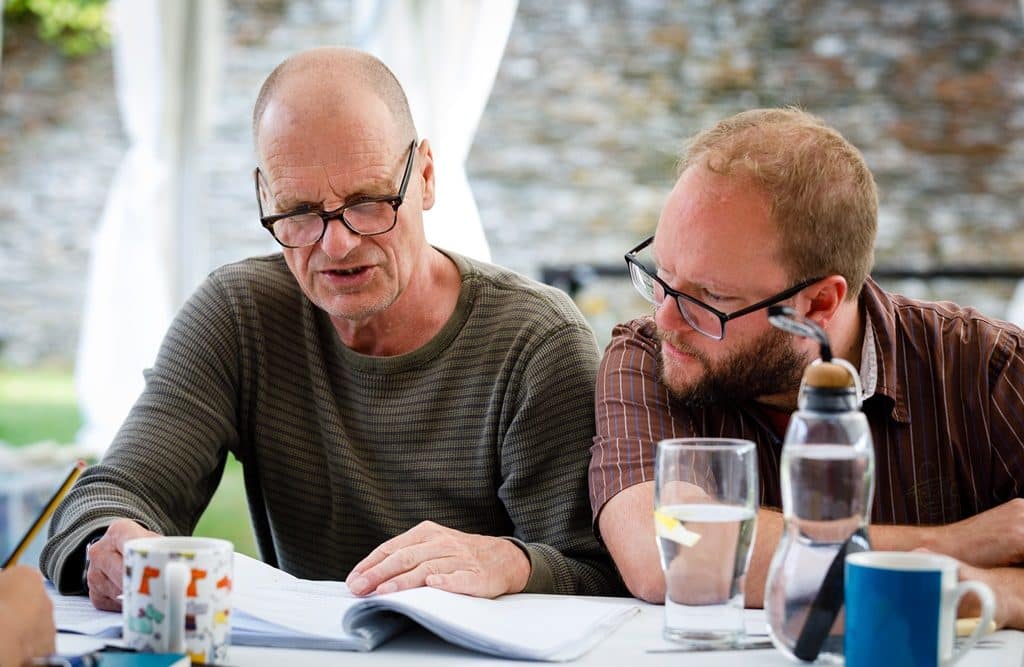
Mike Shepherd and & Carl Grose during rehearsals for The Tin Drum. Photo by Steve Tanner
Shepherd and Grose went on to return to Kneehigh’s routes in the creation of family-friendly Asylum shows: Fup (2018) and The Dancing Frog (2019), based on the classic children’s story by Quentin Blake. This period also saw Kneehigh attack adult themes with aplomb; The Tin Drum (2018), adapted from the Gunter Grass book and subsequent film featured disturbing puppet child Oskar, clutching on to childhood in the shadow of facism. UBU! A Singalong Satire (2019), which was to become Kneehigh’s last ‘stage’ show, offered political commentary on the abuse of power by King UBU that was rife for the Trump era.
The Covid outbreak of 2020 had catastrophic impact on the cultural sector. The Company once again responded to change and challenge with what to outside view appeared to be barely a missed step. The Neon Shadow (2020), having started life as a stage show conceived by Tristan and Yseult performer Tom Jackson Greaves, transformed into a 20 minute film, created in isolation in lockdown and completed with first-night online premiere. While previous plans to mark Kneehigh’s 40th anniversary were paused, the Company instead responded by creating 40 Random Acts of Art (2021): innovative pop-up theatre energetically performed, in a socially distanced manner, in communities across Kneehighs’ ancestral home of St Austell Bay. What was set to become Kneehigh’s final production took them back to their roots – in both location and audience.
While Kneehigh creatively responded to the global pandemic, differences in opinion with the Kneehigh Board as to the future direction of the Company began to take a toll. Following the resignation of both Carl Grose and Mike Shepherd in early 2021, along with long-time writer Anna Maria Murphy, a group of Kneehigh Associates wrote an open letter to the Board of Trustees in which they called for the Company to be wound down. The appeal was backed by Arts Council England, and in June 2021 The Board of Trustees announced the Company would close. The shock and disappointment felt by audiences, the local community and theatre industry was widely felt. However, many agreed that without the artistic leadership that had driven the Company over 40 years, the time was right: ‘Many will mourn the loss of Kneehigh and the opportunities it created for artists in Cornwall. But there is a grace in knowing when to let go’ (Lyn Gardner, The Stage (Read the full article)
From their anti-establishment Cornish roots, Kneehigh negotiated their path to genuine national treasure. Through the Company’s many evolutions in its 40 year history, Kneehigh were always masters of storytelling. The story of the Kneehigh legacy is just beginning, and is set to shine for the next 40 years and beyond.
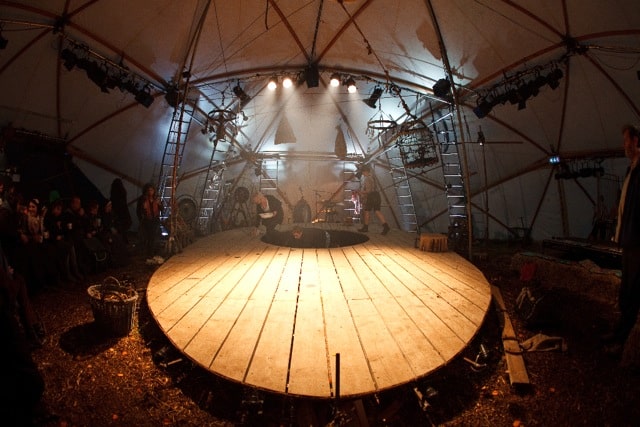
Image: Steve Tanner